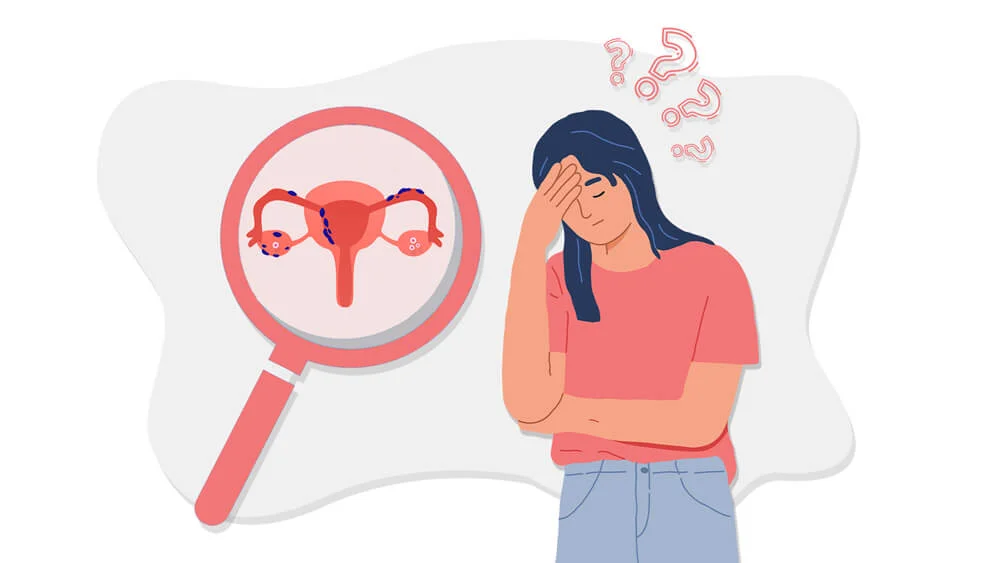Common infertility problems
- Home
- /
- Common infertility problems
Common problems with female infertility

- Failure to ovulate – Eggs are not released from your ovaries. Some conditions may be PCOS, aging, thyroid problems, lifestyle and environmental factors.
- Problems with the menstrual cycle – Like irregular cycles, missed periods. This mostly coincides with failure to ovulate.
- Problems in reproductive system – blocked fallopian tubes, eggs / sperms not able to move, endometriosis, fibroids, polyps, uterine scarring, etc…
- Infections – STI’s, gonorrhoea, syphilis, TB, HPV can prevent fertilization.
- Defective maturation of egg – Due to various reasons, most commonly because of lack of nutrition.
- Implantation failure – failure of a fertilized egg to implant in the uterine wall to begin pregnancy
Some diseases / disorders associated with female infertility
Endometriosis
Endometriosis occurs when the cells that normally line the uterine cavity, called the endometrium, are found outside the uterus instead. Research has found a link between infertility and endometriosis. Studies show that between 25% and 50% of infertile woman have endometriosis and between 30% and 40% of women with endometriosis are infertile.
Polycystic Ovary Syndrome (PCOS)
PCOS is one of the most common causes of female infertility. It is a condition in which a woman’s ovaries and, in some cases, adrenal glands produce more androgens (a type of hormone) than normal. High levels of these hormones interfere with the development of ovarian follicles and release of eggs during ovulation. As a result, fluid-filled sacs, or cysts, can develop within the ovaries. Researchers estimate that 5% to 10% of women have PCOS. The exact cause of PCOS is unknown, but current research suggests that a combination of genetic and environmental factors leads to the disease.
Primary Ovary Insufficiency (POI)
POI is a condition in which a woman’s ovaries stop producing hormones and eggs at a young age. Women with POI ovulate irregularly, if at all, and may have abnormal levels of ovarian and pituitary hormones due to problems with their ovaries. Women with POI often have trouble getting pregnant. However, pregnancy is still possible, though rare. About 5% to 10% of women with POI get pregnant without medical treatment.
Uterine Fibroids
Uterine fibroids are noncancerous growths that form inside the uterus. Uterine fibroids can cause symptoms in some cases, depending on their size and location. Scientists do not know what causes fibroids to form, but it is believed that there may be a genetic basis. Fibroids can contribute to infertility and are found in 5% to 10% of infertile women. Fibroids located in the uterine cavity (as opposed to those that grow within the uterine wall) or those that are larger than 6 centimeters in diameter are more likely to have a negative effect on fertility. Fibroids are more likely to affect a woman’s fertility if they:
- Change the position of the cervix, which can reduce the number of sperm that enter the uterus
- Change the shape of the uterus, which can interfere with the movement of sperm or implantation
- Block the fallopian tubes, which prevents sperm from reaching the egg and keeps a fertilized egg from moving to the uterus
- Interfere with blood flow to the uterus, which can prevent the embryo from implanting
Autoimmune Disorders
Autoimmune disorders cause the body’s immune system to attack normal body tissues it would normally ignore. Autoimmune disorders, such as lupus, Hashimoto’s and other types of thyroiditis, or rheumatoid arthritis, may affect fertility. The reasons for this are not fully understood and differ between diseases, but they are thought to involve inflammation in the uterus and placenta or medications used to treat the diseases. Both men and women can make antibodies that attack sperm or the reproductive organs.
Common problems of male infertility
Men can also contribute to infertility in a couple. In fact, men are found to be the only cause or a contributing cause of infertility problems in couples in about 40% of cases. The most common issues that lead to infertility in men are problems that affect how the testicles work. Other problems are hormone imbalances or blockages or absence of some of the ducts in the male reproductive organs. Lifestyle factors and age-related factors also play a role in male infertility.
Conditions That Affect Sperm Formation
Many different issues can affect the formation of sperm in the testicles. These conditions can lead to sperm that is abnormally shaped or malformed or to low amounts of sperm. Some of the more common issues include:
- Chromosome defects
- Diabetes
- Hyperprolactinemia, which is overproduction of a hormone called prolactin made by the pituitary gland
- Injury to the testicle
- Insensitivity to hormones called androgens, which include testosterone
- Swelling of the testicles from infections such as mumps, gonorrhea, or chlamydia
- Chromosome disorder called Klinefelter syndrome
- Thyroid problems
- Cryptorchidism, which occurs when one or both testicles are not descended
- Varicocele, which is the enlargement of veins in the scrotum; enlarged veins disrupt the blood flow in the testicle and cause an increase in temperature, which negatively affects sperm production. This condition is present in about 40% of men with fertility problems.
Conditions That Affect Sperm Transport
Even if the male’s body produces enough viable sperm, sometimes factors and conditions that affect how or whether the sperm moves can also contribute to infertility. Sperm may move too slowly or not at all and thus die before they can reach the egg. Sometimes the seminal fluid, which contains the sperm, is too thick for the sperm to move around properly. An inability to transport sperm from the testicles to the penis causes about 10% to 20% of the cases of male infertility. The inability can be caused by natural blockages in the tubes that transport sperm from the testicles to the penis or from vasectomy, a surgical procedure that cuts and seals the ends of the tubes. Many men with cystic fibrosis lack the tubes that carry the sperm out of the testicles, making them infertile (but not sterile, because they produce sperm). Some men have problems getting an erection, called erectile dysfunction, which makes having sex difficult. A condition called retrograde ejaculation can also cause infertility. This condition causes sperm to move into the bladder instead of out of the penis. Some medications increase the likelihood of this problem.

